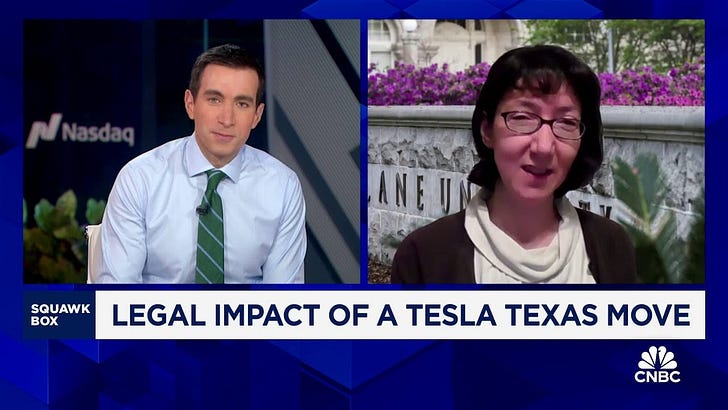Companies Are Following Elon Musk Out of Delaware. Here's Why That's a Very Big Deal
Nearly 2.2 million legal entities, including 68% of Fortune 500 companies, are incorporated in "The First State."
In January 2024, Tesla CEO Elon Musk offered blunt advice to business leaders.
“Never incorporate your company in the state of Delaware,” he wrote on X.
Musk’s acrimony stemmed from a decision by Delaware Chancery Court Chancellor Kathaleen McCormick, who voided his $56 billion compensation package, saying that Tesla had failed to prove the contract was “fair.” The fact that there was no legal precedent for her action and that Tesla’s board, shareholders, and Musk had all approved the payout didn’t matter.
An irritated Musk suggested that entrepreneurs incorporate “in Nevada or Texas” if they want shareholder rights to be respected. In the weeks that followed, Musk took his own counsel, relocating SpaceX’s incorporation to Texas and shifting Neuralink’s registration to Nevada.
A single billionaire deciding to move his companies out of a state because of a legal spat might not seem like a big deal, but Delaware isn’t your typical state. Nearly 2.2 million legal entities, including some 68% of Fortune 500 companies, are incorporated in Delaware, a dominance that stems from a historically friendly business climate and a judiciary that has, until recently, proven adept at resolving complex corporate disputes, not causing them.
This is why Musk’s row with Delaware has caused such a stir. Some speculate the event could trigger a “mass exodus” of corporations from the state. And now it appears one could be underway.
Over the weekend, news broke that Dropbox is abandoning Delaware and moving its headquarters to, you guessed it, Nevada.
“The evaluation committee and our board of directors considered Nevada’s statute-focused approach to corporate law and other merits of Nevada law and determined that Nevada’s approach to corporate law is likely to foster more predictability than Delaware’s approach,” the company announced.
The announcement prompted billionaire hedge fund manager Bill Ackman to disclose that his own company is taking a similar action.
“We are reincorporating our management company in Nevada for the same reason,” said Ackman, chief executive officer of Pershing Square Capital Management, which oversaw $18.6 billion in assets as of August.
Meanwhile, the Wall Street Journal reports that Mark Zuckerberg, the CEO and founder of Meta, is “exploring moving his social-media giant’s legal residence to the Lone Star state.” Meta boasts a $1.76 trillion market cap and is incorporated in Delaware.
Even Delaware’s governor admits the state has a problem. Matt Meyer, a Democrat serving his first term after handily defeating his Republican opponent in November, told Business Insider on Sunday that his administration is “actively reaching out” to companies considering leaving Delaware.
“It’s really important we get it right for Elon Musk or whoever the litigants are in Delaware courts,” Meyer said. “We’re cognizant that there may be some things that need to change.”
Meyer is right.
The details of Musk’s pay package are complicated, but what’s undisputed is that Musk declined a salary in favor of a performance-based pay package that unlocked compensation based on how well Tesla performed.
As NPR recently reported, “many thought it was absurd that Musk would ever hit the targets” for a massive payout since it would require Tesla’s valuation to increase by a factor of 10. But Musk — through vision, innovation, and engineering — defied the odds.
In 2018, when it was announced Musk would be compensated in stock options, Tesla sold 245,000 cars. By 2023, the company was selling 1.8 million electric vehicles. The following year, Tesla passed Volkswagen, Subaru, and BMW in U.S. market share. Today, Tesla’s market cap stands at $1.25 trillion, and that growth benefited not just Musk but consumers, workers, and all Tesla shareholders.
Yet McCormick, in her 101-page opinion, makes it clear she’s not impressed. She says the agreement that made everyone richer was “deeply flawed” and argues the pay package was outside the range of “healthy amounts.”
Her decision might please the tax-the-rich folks and Musk’s political enemies, but what’s become abundantly clear is that it is alarming corporations striving to become the next Tesla.
Companies incorporate in Delaware for the same reason people park their wealth in Switzerland. They believe their property rights will be respected, that shareholders will be treated fairly, and that contracts will be honored. When corporate leaders see a single judge holding up a consensual payout package, they get nervous.
Meyer can talk sweet to CEOs all day, but talk is cheap. If he is serious about preventing a corporate exodus, he should convene an emergency session in which lawmakers can address any “legal ambiguities” and make it clear that property rights and contracts will be honored in Delaware for everyone.
Then he should do his best Teddy KGB impersonation: “Pay that man his money.”




Could you comment on how this judge came to be involved? Did some entity sue over the compensation package? Thank you.
As the owner of a company who has been involved with judges who decide to rule simply based on a “I don’t like what your contract said therefore, I’m going to rule based on what I think your contract should have said” I would be with Musk and running far and fast. In fact, we were incorporated in Delaware and now we are incorporated in Nevada. No company or company owner should ever have to deal with judges who rule on emotion instead of on what is agreed upon in the contract. And any judge who rules that way should be disbarred.